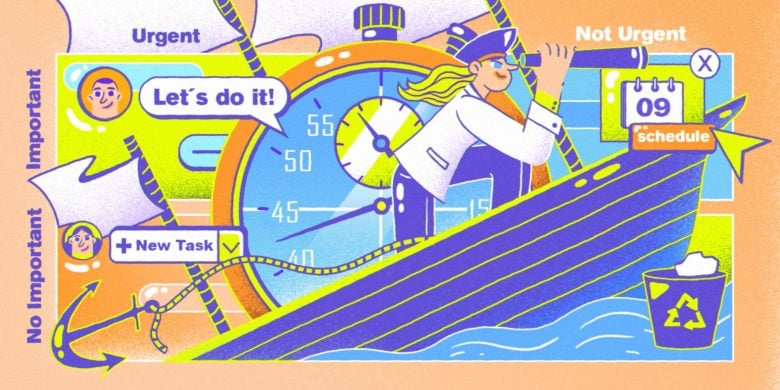Do you know with certainty what your employees are doing right now?
The ability to keep employees focused without micro-management is an art.
Productivity management is a problem that affects large and small businesses alike. However, small businesses tend to suffer more. Because they depend on the output of each individual in the team more heavily, the effects when employees can’t concentrate are more drastic.
This post will cover employees’ typical productivity problems and give solutions that managers can use to handle these concerns.
Boost your team’s efficiency with Hubstaff's productivity tools
Employee productivity problems faced by employers
If you ask employers from different companies about problems they’re often dealing with, don’t be surprised to hear one thing in common: employee focus and productivity, or lack thereof.
When an employee starts to feel unmotivated, it can be easy for them to spiral downward into poor performance and low interest. Without guidance, a consistently effective individual can turn into someone who spends more time at work browsing through their phone in just a matter of weeks. In recent years, many businesses have been dealing with problems with cell phones in the workplace.
Fixing this or any focus-related problem is easy with just one employee. Still, it’s more likely that the problem is systemic and requires a broader strategic approach to find the root of the issue and address it in the long term.
First, you need to ask yourself why your team has lost focus. Here are some common reasons employees need help to stay on task.
Lack of direction in the team
If your employees feel like they’re going in circles, they’ll quickly tire themselves out. In many cases, this isn’t their fault. A mistake that many employers and managers make is telling their team what to do but not explaining why they’ll be doing it.
And while employees will be inspired to perform well and stand out initially, it won’t take long before they ask, “Why are we doing this again?” From there, their capacity to focus will steadily decline, and so will their work output.
Learn more about how to be an effective manager here.

A toxic work environment
“Toxic” can mean many different things, but here’s the bottom line: if an employee associates negative sensations like unexplained tiredness or inability to see the purpose of what they are doing with work, they are not in a good place.
The reason could be anywhere from unpleasant colleagues, lack of guidance, or just because they haven’t taken a vacation in two years. While they always have the choice to leave, it’s essential to know that however their manager decides to handle the situation plays a pivotal role in what will happen next. Read about the signs of toxic work culture.
There are just too many distractions
Resisting distractions is a skill that can be developed over time, but even the most experienced and accomplished individuals can fall victim to them occasionally.
But things get messy when the number of things that can keep your employees’ focus from work is simply too high. It’s important to limit distractions and set clear boundaries.
Imagine having so much other stuff you can do while working — the arcade games installed on your smartphone, that book lying just behind your laptop, or that gaming console lying in the corner of the office. A solid mindset helps, but avoiding them will cost a lot of mental energy if they’re just an arm’s reach away.
Without further ado, here are ways a manager can ensure that employees remain focused.
1. Be transparent with expectations from the beginning
You can worry about how to keep your employees focused all day. But the truth is, if they aren’t aware of what they’re supposed to do in the first place, you won’t have much to work with. Focusing is impossible if you’re unsure what to focus on.
In other words, make it a point to set clear expectations early on. You’ll be thanking yourself down the road.
Think of being transparent with your expectations as giving your team a head start. Let them know that you’re counting on them to make good use of their time and that you’ll be taking measures to ensure they are doing just that. This will let them know that there is a standard they need to meet and that you trust them at the same time.
2. Give credit for good work
You’ll have some people in your team who are highly dedicated to work from the get-go. These individuals can stay concentrated at work for long periods, and you wonder how long they’ll be able to keep it up.
Generally, it’s not a question of whether they can or cannot. It’s more about how much they want to. So, how do you keep these employees happy and motivated?
When an employee is performing well, give credit where it’s due. One of the simplest ways to do this is by giving recognition, even through just a mention in your team chat. It helps keep them motivated and can incentivize them to continue upping their game.
3. Professional development
Investing in professional development is a strategic approach to keep employees engaged and continuously improving. Offering opportunities for skill development and career advancement benefits individual employees and strengthens the workforce’s overall capabilities.
Providing access to workshops, training programs, and mentorship opportunities demonstrates a commitment to employees’ growth and enhances their sense of value within the organization.
4. Encourage work-life balance in the workplace
When job searching, there are two things people often consider to be the highest priority: money and work-life balance. A lot of the time, even a high-paying job isn’t worth sacrificing balance. Harmony between their personal and professional lives makes employees happy with their jobs.
Emphasizing work-life balance encourages your employees to take care of themselves more actively. This is one of the best long-term solutions you can do to keep your team consistently productive.
While it may sound counterintuitive, pouring only some of their energy into work helps them work better. How do we keep employees from leaving? Simple: let them leave their work every once in a while.
Knowing that they can take breaks when needed and — more importantly — that their personal lives aren’t less important than work helps reduce stress and keep their minds sharp.

5. Goal setting
Collaborative goal setting is a powerful tool for keeping employees motivated, focused, and aligned with the organization’s objectives. Involving employees in the goal-setting process creates a sense of ownership and accountability.
This goes far beyond to do lists, and has more to do with long-term goals that move the needle for your organization. Human resources and managers should be talking about these goals with direct reports regularly to ensure employees understand their goals and expectations.
Clear and achievable goals, when broken down into manageable tasks, provide employees with a roadmap for success. This clarity helps them stay on track, measure progress, and celebrate achievements.
6. Schedule annual retreats
There are various reasons why you should have a team retreat, but here’s the bottom line: it can do wonders for your team’s mental health to spend time together.
Retreats offer employees a well-deserved break from work and a chance to develop personal connections with their colleagues outside of work hours. Hours of work-related discussions inevitably lead to burnout, and retreats mitigate this problem very effectively.
When your team returns to work, they’ll have a stronger bond with everyone else and be back entirely refreshed. Both bring only good things for your business.
7. Provide resources
Equipping employees with the necessary tools, training, and resources is fundamental to their efficiency and success. Adequate resources streamline workflows, reduce frustration, and contribute to a positive work experience.
This includes providing access to up-to-date technology, relevant training programs, and materials for task completion. By investing in the tools employees need, employers demonstrate a commitment to their success and efficiency.
8. Encourage breaks
Encouraging regular breaks is essential for maintaining employee productivity and well-being. Employers must demonstrate this behavior for their team so employees feel comfortable taking breaks.
Whether it’s a short walk, a brief relaxation period, or a change of scenery, these pauses in the workday can rejuvenate employees, enhance creativity, and contribute to long-term job satisfaction. Recognizing the importance of breaks demonstrates a commitment to a healthy work culture where employees are valued for their output and holistic well-being.
9. Track time and work with Hubstaff
When employees are working on company time, a policy of time logging should be in place. This is best achieved using time tracking with employee computer monitoring and screen capture capabilities. Keeping your team focused is important, but tracking their hours is crucial.
The ability to track time and tasks is what Hubstaff — an all-in-one productivity solution — brings to the table and more. Teams can record the time they work, and you can view the screenshots to get an idea of how they’ve worked throughout the day.
The ability to see how employees spend their time during business hours can emphasize accountability and give managers valuable insights into workloads and burnout.
On top of time tracking, Hubstaff has timesheets and automated payroll features that make team management hassle-free. You can set the app to automatically send payments based on the timesheets created from their worked hours so you can focus on growing your business.
Hubstaff is available on Windows, MacOS, iOS, and Android. Pricing starts at $5/month per user.
What methods do you use to keep your team in top shape?
Having skilled people in your team is excellent for your business. But, as cliché as it may sound, they’re only human — and sooner or later, everyone succumbs to distractions and stress. Try the tips above to learn how to keep employees focused without micromanaging.
Do you have techniques of your own to help your employees stay focused? Do you follow an authoritative approach, or are you more laid back? Let us know what works for you in the comments below.
Subscribe to the Hubstaff blog for more posts like this

Most popular
The Critical Role of Employee Monitoring and Workplace Security
Why do we need employee monitoring and workplace security? Companies had to adapt fast when the world shifted to remote work...
15 Ways to Use AI in the Workforce
Whether through AI-powered project management, strategic planning, or simply automating simple admin work, we’ve seen a dramatic...
The AI Productivity Panel: Lessons From Leaders on What’s Working (and What’s Not)
When I moderated this AI productivity panel, I expected a solid conversation. What I didn’t expect was the flood of real-world i...
Employee Performance Dashboards: Templates, Tools, and Best Practices
Keeping track of how your team’s really doing can be tricky. Spreadsheets pile up, one-on-ones only tell part of the story, and...





